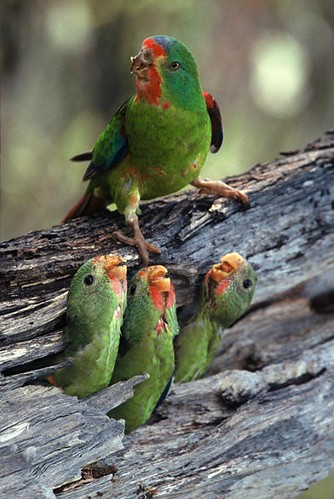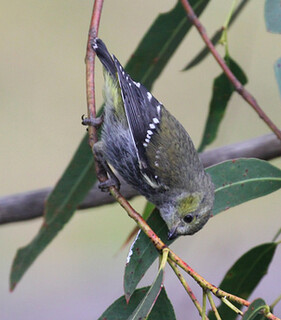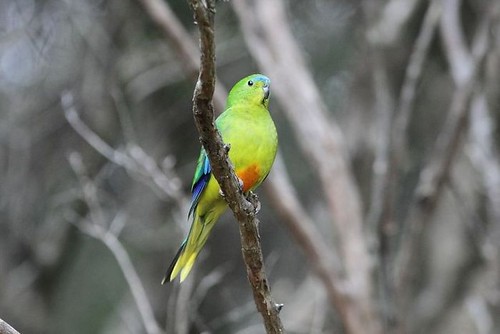 Swift parakeet with chicks. Image by Greens MPThree highly vulnerable birds species in Tasmania may find their numbers are given a reprieve from almost certain extinction after Australian National University researchers turned to crowdsourcing site Pozible to raise money for nesting boxes.
Swift parakeet with chicks. Image by Greens MPThree highly vulnerable birds species in Tasmania may find their numbers are given a reprieve from almost certain extinction after Australian National University researchers turned to crowdsourcing site Pozible to raise money for nesting boxes.
Dejan Stojanovic and Robert Heinsohn put their project to raise $40,000 to provide nesting boxes for the swift parrot, forty-spotted pardalote and orange-bellied parrot, all of which are being decimated by the sugar-glider possum which was introduced into Tasmania sometime over the past 50-100 years.
Forestry activity appears to have spurred possum numbers, which prey on adult nesting females and their eggs.
Professor Heinsohn said they turned to crowdsourcing because formal research funding channels take so long and the chances of winning a grant was so remote.
“The urgency is so great that we just have to move right away,” Professor Henisohn said. Forty-spotted pardalote. Image by Matt France
Forty-spotted pardalote. Image by Matt France
“Crowdsourcing funds will be cleared in just a few weeks and will go straight into our research accounts so we can go out and buy the boxes and do things on the ground practically almost immediately.
“If we wait even another year it could be just too late because the numbers are in such free fall.”
Dr Stojanovic said the level of media interest in their story had been heartening.
“My job is usually so depressing because I spend my days alone in the forest look at dead birds,” he said. “Today has been fantastically encouraging.”
Dr Stojanovic and Professor Heinshohn will use the proceeds of their crowdsourcing to place 1000 nesting boxes on offshore islands off the eastern coast of Tasmania. They will also assess whether the sugar gliders pose a risk to the rare orange-bellied possum which has just one population in the World Heritage Area of southwest Tasmania.
“The swift parrots naturally come to the island but only stay there when the food sources are good. But  An Orange-bellied Parrotbecause most of the forest is second growth, there aren’t enough hollows for them to nest in. The boxes will help the chances of these species getting through this.”
An Orange-bellied Parrotbecause most of the forest is second growth, there aren’t enough hollows for them to nest in. The boxes will help the chances of these species getting through this.”
The research predicted that the population of the birds will halve every four years, with a possible decline of 94.7 per cent over 16 years.